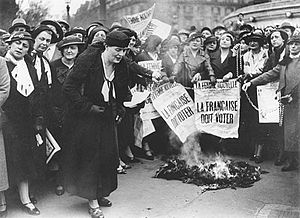Louise Weiss facts for kids
Quick facts for kids
Louise Weiss
|
|
|---|---|

|
|
| Born | 25 January 1893 Arras, France
|
| Died | 26 May 1983 (aged 90) Paris, France
|
| Nationality | French |
| Occupation | Politician, journalist and author |
| Known for | Being an early pro-European feminist |
| Parent(s) | Paul Louis Weiss Jeanne Félicie Javal |
| Relatives | Fanny Dombre-Coste (cousin) |
Louise Weiss (born January 25, 1893, in Arras, France – died May 26, 1983, in Paris) was a very important French author, journalist, and politician. She was also a strong supporter of women's rights and a united Europe.
Contents
Her Early Life and Career
Louise Weiss grew up in Paris with five brothers and sisters. Her family was from Alsace, a region in France. Even though her family didn't want her to, she trained to be a teacher. She even studied at Oxford University.
During World War I (1914-1918), Louise worked as a nurse. She even helped start a hospital. After the war, she became a publisher for a magazine called L'Europe nouvelle from 1918 to 1934.
Fighting for Women's Rights
From 1935 until World War II began, Louise Weiss worked hard for women's suffrage. This means she fought for women to have the right to vote. In 1934, she started a group called La femme nouvelle (The New Woman). She wanted women to have a bigger role in public life.
Louise organized protests and demonstrations. She even chained herself to a street light in Paris with other women to show how important voting rights were. In 1935, she tried to sue the French government because women couldn't vote, but she didn't win.
A Journalist for Peace
During World War I, Louise Weiss started writing for newspapers using a different name. She met important people who wanted their countries to be free.
In 1918, she started her own weekly newspaper, Europe nouvelle (New Europe). She published it until 1934. Famous writers and politicians, like Thomas Mann, wrote for her paper. Louise believed in bringing countries closer together, especially France and Germany. She called people who worked for peace "peace pilgrims."
In 1930, she created the "Ecole de la Paix" (School of Peace). This was a private school that taught about international relations. She dreamed of a united Europe. However, when the Nazis took power in Germany, the idea of unification became much harder.
During World War II
During World War II, Louise Weiss was part of the French Resistance. This was a secret group that fought against the occupation of France. She was the main editor of a secret magazine called "Nouvelle République" from 1942 to 1944.
After the war, in 1945, she helped start an institute in London to study war and conflict. She traveled all over the world, visiting places like the Middle East, Japan, China, and Africa. She made documentary films and wrote books about her travels.
A European Politician
In 1979, Louise Weiss became a Member of the European Parliament (MEP). She was part of the Gaullist Party. At 86 years old, she was the oldest member in the Parliament. This meant she was the first "oldest member" of the European Parliament. She continued to be an MEP until she passed away in 1983 at the age of 90.
The main building of the European Parliament in Strasbourg is named after her to honor her work.
Louise Weiss Museum
There is a special part of the municipal museum in Saverne that tells the story of Louise Weiss's life. It shows many items she gave to the town, like historical documents about her career.
Her Published Works
Louise Weiss wrote many books, including:
Books on Politics
- La République Tchécoslovaque, 1919
- Milan Stefanik, Prague 1920
Life Stories (Biographies)
- Souvenirs d'une enfance républicaine, Paris, 1937
- Ce que femme veut, Paris, 1946
- Mémoires d'une Européenne, Paris 1968-1976
Novels (Fiction Books)
- Délivrance, Paris 1936
- La Marseillaise, Vol. I and II Paris, 1945; Vol. III Paris 1947
- Sabine Legrand, Paris 1951
- Dernières Voluptés, Paris, 1979
Plays for Theater
- Arthur ou les joies ...
- Sigmaringen ou les potentats du néant
- Le récipiendaire
- La patronne
- Adaptation des Dernières Voluptés
Travel Books
- L'or, le camion et la croix, Paris, 1949
- Le voyage enchanté, Paris, 1960
- Le Cachemire, Les Albums des Guides Bleus, Paris, 1955
Essays on Society
- Lettre à un embryon, Paris 1973
Art, History, and Folk Tales
- Contes et légendes du Grand-Nord, Paris, 1957
Awards and Recognition
Louise Weiss received many honors for her work:
- The main building of the European Parliament in Strasbourg is named after her.
- A street in Paris is named in her honor.
- A primary school in Strasbourg is also named after her.
- She was an honorary member of the Upper University Council in Strasbourg.
- She won the Robert Schuman Prize.
- She received the Grand Officer of the Legion of Honor, a very high French award.
- She was an Officer of the Order of the White Lion in 1924.
The Louise Weiss Foundation
Every year, the Louise Weiss Foundation gives an award. This prize goes to a person or group who has done the most to help peace, improve how people get along, and work for the good of Europe.
More to Read
Florence Hervé: Frauengeschichten - Frauengesichter, Vol. 4, trafo verlag 2003, 150 pp., illustrated, ISBN: 3-89626-423-0
See also
 In Spanish: Louise Weiss para niños
In Spanish: Louise Weiss para niños
 | James Van Der Zee |
 | Alma Thomas |
 | Ellis Wilson |
 | Margaret Taylor-Burroughs |

